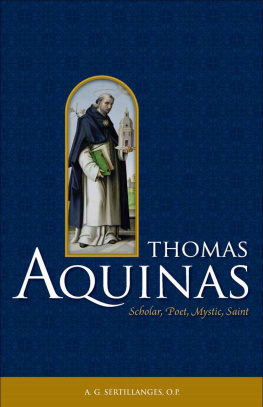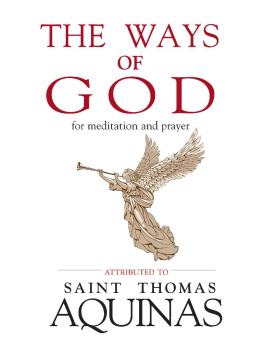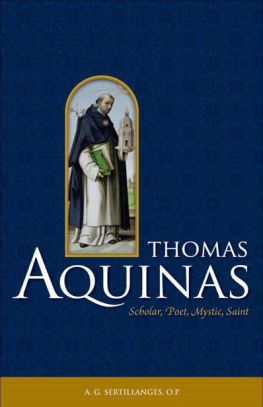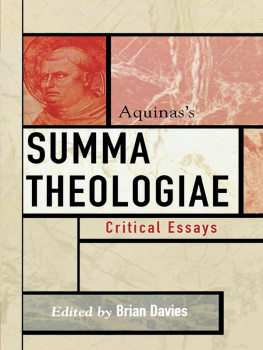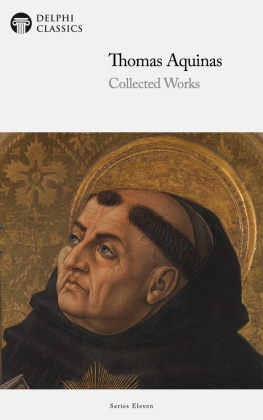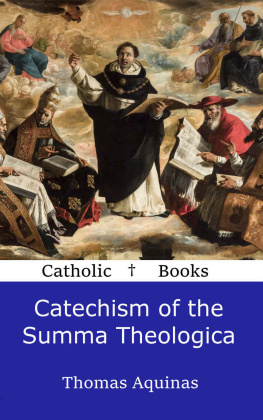St. Thomas Aquinas [Aquinas - Treatise on Separate Substances
Here you can read online St. Thomas Aquinas [Aquinas - Treatise on Separate Substances full text of the book (entire story) in english for free. Download pdf and epub, get meaning, cover and reviews about this ebook. year: 2015, genre: Science. Description of the work, (preface) as well as reviews are available. Best literature library LitArk.com created for fans of good reading and offers a wide selection of genres:
Romance novel
Science fiction
Adventure
Detective
Science
History
Home and family
Prose
Art
Politics
Computer
Non-fiction
Religion
Business
Children
Humor
Choose a favorite category and find really read worthwhile books. Enjoy immersion in the world of imagination, feel the emotions of the characters or learn something new for yourself, make an fascinating discovery.

- Book:Treatise on Separate Substances
- Author:
- Genre:
- Year:2015
- Rating:4 / 5
- Favourites:Add to favourites
- Your mark:
- 80
- 1
- 2
- 3
- 4
- 5
Treatise on Separate Substances: summary, description and annotation
We offer to read an annotation, description, summary or preface (depends on what the author of the book "Treatise on Separate Substances" wrote himself). If you haven't found the necessary information about the book — write in the comments, we will try to find it.
St. Thomas Aquinas [Aquinas: author's other books
Who wrote Treatise on Separate Substances? Find out the surname, the name of the author of the book and a list of all author's works by series.
Treatise on Separate Substances — read online for free the complete book (whole text) full work
Below is the text of the book, divided by pages. System saving the place of the last page read, allows you to conveniently read the book "Treatise on Separate Substances" online for free, without having to search again every time where you left off. Put a bookmark, and you can go to the page where you finished reading at any time.
Font size:
Interval:
Bookmark:

[1] Since we cannot be present at the holy ceremonies in honor of the angels, we should not let this time of devotion go by fruitlessly; rather, such time as we do not spend in singing their praises, we should spend in writing about them. And because our aim is to present as best we can the excellence of the holy angels, we ought to begin with mans earliest conjectures about the angels. In this way, we shall be in a position to accept whatever we find that agrees with faith, and refute whatever is opposed to Catholic teaching.
[2] The first of those who philosophized on the natures of things believed that only bodies existed and held that the first principles of things were certain corporeal elements, either one or several. Anaxagoras, on the other hand, thought that in the case of diverse things which have similar parts, the first principles are the infinite minimal parts.
Moreover, since all of these philosophers had the natural conviction that they should consider as god that which was the first principle of things, just as each of them had attributed to a certain corporeal element the rank of a first principle, so he likewise felt that the name and honor of divinity should be given to this element. These things were mid for this reason, that for all of these men and their followers, it was the case that no incorporeal substances, which we call angels, existed.
The Epicureans, however, who traced their origin to the teachings of Democritus, posited certain corporeal gods, resembling human beings in appearance,
[3] The early philosophers, however, opposed this opinion in three ways. For although, at first, Anaxagoras with the other Natural Philosophers posited certain material or corporeal principles, nevertheless, he was the first among the philosophers to assert a certain incorporeal principle, namely, an intellect. Since indeed, according to his view, all corporeal things were mixed in all things, it did not seem possible that corporeal bodies could have been distinguished from one another, unless there existed some principle of distinction which was itself completely unmixed and had nothing in common with corporeal nature.
But, although Anaxagoras opinion was much closer to the truth than that of the philosophers who posited only a corporeal nature, yet it falls short of the truth in two respects.
First, because it is apparent from his position that he posited only one separate intellect which had produced this world by distinguishing what was mixed. But since we attribute the establishment of the world to God, from this point of view, we can gather nothing from his opinion as to the incorporeal substances, which we call angels and which axe below God and above corporeal natures.
Second, because concerning the intellect, which he said to be one and unmixed, he seems to have failed in this respect, since he did not sufficiently express its power and eminence. Instead of defining this intellect, which he considered to be separate, as the universal principle of being, he makes it to be only a distinguishing principle, for he did not hold that the bodies that were mixed with one another, received being (esse) from the separate intellect; they received from it only distinctions.
[4] Plato therefore proceeded by a more adequate way to refute the opinion of these early Naturalists.
Now our intellect uses a two-fold abstraction in arriving at the understanding of truth: One, according as it grasps mathematical numbers, magnitudes, and figures without the understanding of sensible matter; for, in understanding the number two or three, or a line, a surface, a triangle, or a square, there is not included together with it in our apprehension anything pertaining to what is hot or cold, or the like, which is perceptible by sense. The intellect, however, uses another abstraction when it understands something universal without the consideration of something particulax, as when we understand man without including in our understanding anything about Socrates, Plato, or any other individual. The same appears in other cases.
[5] Plato accordingly posited two classes of beings abstracted from sensible things, namely, mathematicals, and universals to which he gave the name of Forms or Ideas.
[6] Again, inasmuch as all Forms participate in the One, the intellect likewise must participate in the Forms of things in order to have understanding.
Among these intellects, an intellect is higher according as it is nearer to the first intellect which has full participation in the Forms; just as among the gods or unities, that one is higher which shares more perfectly in the first unity.
Although Plato distinguished between the gods and the intellects, he did not mean to imply that the gods could not have understanding. It was his desire, rather, that they should understand in a supra-intellectual manner; that is, instead of understanding by participating in certain Forms, they should have understanding through themselves, with the proviso that every one of them was good and one only through participating in the first One and Good. Again, because we see that certain souls possess understanding which, however, does not befit a soul by the fact that it is a soul, otherwise it would follow that every soul is an intellect and that it would he intelligent in its whole nature, he further posited that under the order of the separate intellects, there was an order of souls, the nobler of which participate in intellectual power, while the lowest of them are lacking in it.
[7] In this way, below the order of souls, Plato posited the order of bodies, but in such a manner that the highest of the bodies, namely, the first heavens, which is moved by its own motion, receives motion from the highest soul, and so on to the very lowest of the heavenly bodies. Below these, furthermore, the Platonists placed immortal bodies, namely, areal or ethereal bodies, which participate eternally in soul. Some of these they considered to be altogether independent of earthly bodies and these they said to be bodies of demons; others became entombed in earthly bodies, which is the case with human souls.
In this way, therefore, between us and the highest God, it is clear that they posited four orders, namely, that of the secondary gods, that of the separate intellects, that of the heavenly souls, and that of the good or wicked demons. If all these things were true, then all these intermediate orders would be called by us angels, for Sacred Scripture refers to the demons themselves as angels.
[8] But the basis of this position is found to be without foundation, for it is not necessary that what the intellect understands separately should have a separate existence (esse) in reality. Hence, neither should we posit separate universals subsisting outside singulars nor likewise mathematicals outside sensible things; for universals are the essences of particular things themselves and mathematicals are certain limits of sensible bodies.
First, he established by both reason and examples, the fact that everything moved is moved by another; and that if something is said to be self-moved, this is not true of it according to the same part but according to diverse parts of itself, so that one part is moving and another is moved.
Furthermore, Aristotle aimed to establish the eternity of motion and that only an infinite power can move in an infinite time, and likewise that no power belonging to a magnitude is an infinite power.
[9] Again, since in the class of movable beings, that which is desirable is present as an unmoved mover, whereas the one desiring is present as a moved mover, Aristotle further concluded that the first unmoved mover is as an appetible good and that the first self-moved mover, namely the first movable, is moved through a desire of that unmoved mover. However, we must furthermore keep in mind that in the order of appetites and of appetible objects, the first is that which is through itself an object of understanding, for intellective appetite seeks that which is good through itself; whereas sensitive appetite cannot rise to the appetition of that which is good in itself but only that which appears good. For that which is simply and absolutely good does not fall under the apprehension of sense but only of the intellect.
Next pageFont size:
Interval:
Bookmark:
Similar books «Treatise on Separate Substances»
Look at similar books to Treatise on Separate Substances. We have selected literature similar in name and meaning in the hope of providing readers with more options to find new, interesting, not yet read works.
Discussion, reviews of the book Treatise on Separate Substances and just readers' own opinions. Leave your comments, write what you think about the work, its meaning or the main characters. Specify what exactly you liked and what you didn't like, and why you think so.

